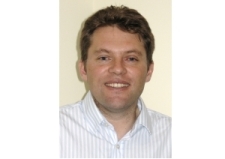| (Note: The most updated information of this section can be found in the conference booklet) |
|
Alex Rogers (University of Southampton)
http://www.ecs.soton.ac.uk/people/acr
|
|
 Alex Rogers is a Reader in the Agents, Interaction and Complexity Research Group at the University of Southampton in the UK. Originally graduating with a degree in Physics, he spend five years working as a field engineer in the oil industry before returning to academia having developed an interest in complexity science and multi-agent systems. His research interests address the challenges in developing and applying agent-based algorithms and mechanisms for the control of decentralised systems. Alex Rogers is a Reader in the Agents, Interaction and Complexity Research Group at the University of Southampton in the UK. Originally graduating with a degree in Physics, he spend five years working as a field engineer in the oil industry before returning to academia having developed an interest in complexity science and multi-agent systems. His research interests address the challenges in developing and applying agent-based algorithms and mechanisms for the control of decentralised systems.
This work has addressed applications in areas such as sensor networks and unmanned autonomous vehicles, and most recently, has focused on applications within future energy systems such as the smart grid.
|
|
Delivering the Smart Grid: A Grand Challenge for Autonomous Agents Research
Restructuring electricity grids to meet the increased demand of electric vehicles and heat pumps, while making greater use of intermittent renewable energy sources, represents one of the greatest engineering challenges of our day. This modern electricity grid, in which both electricity and information flow in two directions between large numbers of widely distributed suppliers and generators - commonly termed the 'smart grid' - represents a radical reengineering of infrastructure which has changed little over the last hundred years. However, the autonomous behaviour expected of the smart grid, its highly distributed nature, and the existence of multiple stakeholders each with their own incentives and interests, challenges existing engineering approaches. In this talk, I will describe why I believe that autonomous agents and multi-agent systems are essential for delivering the smart grid as it is envisioned. I will present some recent work that has been done in this area, and describe many challenges that still remain.
|
|
Colin Camerer (California Institute of Technology)
http://www.hss.caltech.edu/~camerer/camerer.html
|

Colin Camerer is the Robert Kirby Professor of Behavioral Economics at Caltech. He earned a Ph.D. from the University of Chicago in 1981 and worked at Northwestern, Penn, and Chicago before Caltech. He has published more than 150 peer-reviewed articles and book chapters and wrote or co-edited four books. Camerer’s research group is interested in the psychological and neural basis of choice, strategizing in games, and trading in markets.
Our focus is on complex goal-directed choices which typically involve rewards that depend on random events or choices by others. Recent neuroeconomic fMRI projects involve self-control in choosing tempting foods, weighting probabilities, curiosity, choice overload, and the contrast between hypothetical and binding (real) choices. His group also does economics using field data—testing game theory models of realistic limits on strategic thinking, using Swedish lotteries and movie revenues. Earlier projects examine hot hand misperceptions and sunk cost fallacies in NBA basketball, and labor supply of cab drivers. Our group also does field experiments, studying risk and time preferences, and group favoritism in Vietnam.* Prof. Camerer has been the past president of the Economic Science (experimental economics) Association and the Society for Neuroeconomics, and was elected a Fellow of the Econometric Society and a member of the American Academy of Arts and Sciences.
|
|
Lab and field evidence of a cognitive hierarchy in strategic thinking
When software agents interact with people, game theory provides a framework to help the agents make decisions. However, human behavior in games differs from that of the infinitely rational beings studied in classical game theory. Cognitive hierarchy (CH) models offer an algorithmic approach to modelling bounded rationality in strategic thinking, particularly for new strategic environments or as initial conditions for models of learning from experience. CH models have been applied to many experimental data sets, and to some field settings including Swedish lottery games and quality disclosure of movies through critics' reviews. There is also evidence from measuring visual attention, and fMRI of brain activity, which is consistent with steps of strategic thinking.
|
|
Moshe Tennenholtz (Technion/Microsoft Research Israel)
ACM/SIGART Autonomous Agents research award 2012 winner
http://iew3.technion.ac.il/Home/Users/Moshet.phtml
|

Moshe Tennenholtz is the Sonheimer Professor at the Technion--Israel Institute of Technology. He is also a Principal Researcher at Microsoft Research and a founder of the basic research group at the Microsoft Israel R&D center. Moshe received his B.Sc. in Mathematics from Tel-Aviv University (1986), and his M.Sc. and Ph.D. (1987, 1991) from the Department of Applied Mathematics and Computer Science in the Weizmann Institute.
Moshe served as the editor-in-chief of the Journal of Artificial Intelligence Research [JAIR]; he is also an associate editor of Games and Economic Behavior, the international journal of autonomous agents and multi-agent systems, and of the transactions on economics and computation, serves on the editorial board of the Journal of Machine Learning Research, the moderator for the computer science and game theory section of the arXiv, and served on the editorial board of the AI magazine.
Moshe is a AAAI fellow and a fellow of the society for advancement of economic theory. He served as program chair of the ACM Electronic Commerce [EC] conference, and of the TARK conference. He was also co-founder and chief scientist of companies in the area of e-commerce. In joint work with colleagues and students he introduced several pioneering contributions to the interplay between computer science and game theory, such as the study of artificial social systems, co-learning, non-cooperative computing, distributed games, the axiomatic approach to qualitative decision making, the axiomatic approach to ranking, reputation, and trust systems, competitive safety analysis, program equilibrium, mediated equilibrium, and learning equilibrium, as well as the first near-optimal polynomial algorithm for reinforcement learning in stochastic games.
|
|
Social Contexts
This talk will advocate the explicit treatment of social contexts for the design of automated agents and multi-agent systems. In particular, I will illustrate how social contexts effect the design of optimization algorithms, how social contexts can be designed to lead to efficient and stable multi-agent systems, and how adopting assumptions about the nature of the social context can provide powerful solutions to classical challenges in game theory and reinforcement learning.
|
|